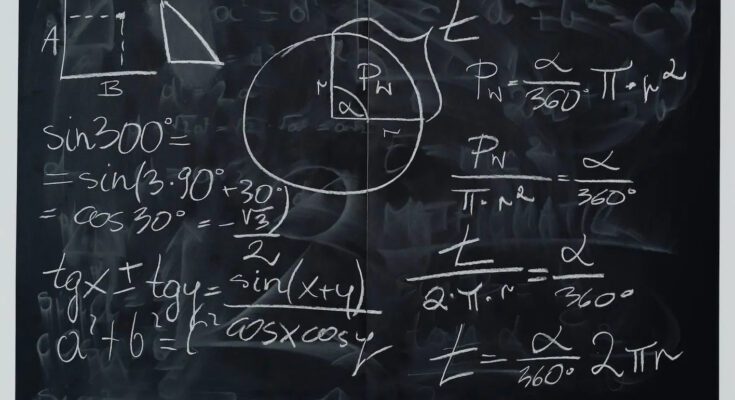Emma’s relationship with math was once defined by struggle and confusion. The quadratic equation was her nemesis, a symbol of her battle with the subject. Then, during one pivotal class, everything changed. A formula that had baffled her for weeks suddenly unraveled its secrets. This moment of clarity was more than just academic success; it represented a shift in her perception of math within the International Baccalaureate (IB) curriculum. For numerous students like Emma, math can appear as an insurmountable peak, its complexity and perceived lack of relevance forming a barrier to success. Yet, the reality is that math is an indispensable tool within the IB. This article aims to demystify the math formula sheet, demonstrating how, when utilized effectively, it can become a formidable asset in the academic journey.
Math in the IB Curriculum A Multidisciplinary Keystone
Within the IB curriculum, math is the thread that stitches together diverse subjects. It underlies economic models that decipher market trends and physics formulas that make sense of the universe. Even in the realm of art, math’s role is crucial, informing the rules of proportion and perspective that create harmony and balance. “Math equips students with a way of thinking that transcends the subject itself,” asserts Mr. Johnson, an IB math educator. “It’s about cultivating an analytical approach that’s applicable across various disciplines.”
The essence of the IB math experience is the development of critical thinking and problem-solving abilities. According to educators like Mr. Johnson, math education transcends rote learning of formulas; it’s about leveraging these formulas as analytical tools to tackle complex problems. In assessments, a student’s ability to apply math formulas effectively can significantly impact their performance. Mastery of these formulas is essential for unlocking an IB student’s potential for deep analysis.
Overcoming IB Math Hurdles
The journey to math proficiency is strewn with challenges. For IB students, the conceptual depths of calculus or the stochastic nature of probability can present significant hurdles. Insights from a recent survey of IB students indicate that these topics are perceived as some of the most formidable parts of their math curriculum. Compounding the difficulty of the content are psychological barriers, such as math anxiety. Dr. Smith, an educational psychologist, notes, “Math anxiety can act as a barrier, hindering students’ ability to engage with and comprehend math concepts.”
Yet, these challenges are not unbeatable. Overcoming them involves cultivating a growth mindset, which reframes challenges as opportunities for growth. Persistence is crucial, as is the recognition that achieving math proficiency is a process that requires dedication and time.
Blueprints for Math Mastery
Developing effective study habits is essential for mastering math. A math formula sheet, for instance, is not just a list to be memorized; it’s a map guiding students through complex problems. Regular revision of these formulas, coupled with their application in various contexts, helps cement understanding. For example, integrating math problems into daily routines, like calculating the time needed to complete tasks or budgeting for a purchase, can make formulas more relatable and easier to grasp.
Practice is the cornerstone of math mastery. It’s through repeated application that students learn to navigate the nuances of math formulas. Beyond the classroom, resources such as textbooks that break down complex concepts, online platforms offering interactive exercises, and tutoring sessions tailored to individual needs can provide invaluable support. These tools are not just for passing exams; they’re for building a solid foundation in math that will serve students well in the IB and beyond.
Math Formulas at Work Real-World Applications
The real-world value of math formulas becomes evident when we look at the stories of IB alumni. Take, for instance, a former IB student who now uses statistical models to predict economic trends in her role as a financial analyst. Another applies geometric principles in his work as an architect, designing sustainable and aesthetically pleasing structures. These case studies highlight the tangible benefits of math skills honed during the IB years.
In various industries, from technology to healthcare, math formulas are the silent engines driving innovation and efficiency. Classroom learning translates into the ability to tackle real-world problems, whether it’s in coding algorithms or analyzing scientific data. Understanding the practical applications of math formulas equips students with a toolkit for success in a wide range of careers.
Personal Triumphs in the World of IB Math
Every student who has navigated the world of IB math has their own story of personal growth. Consider a student who, after countless hours wrestling with the complexities of trigonometry, finally experienced the satisfaction of solving a difficult problem. This moment of triumph is a testament to the perseverance and strategic approach required to master challenging math formulas. Students often share that it’s not just about the formulas themselves but about the confidence and problem-solving skills gained through the process.
The discipline of math shapes how individuals approach life’s complex problems. Beyond the classroom, the logical framework and analytical skills developed through the study of math formulas can influence decision-making in various aspects of life. It’s a testament to the far-reaching impact of a solid mathematical foundation.
Embracing the Formula for Future Success
Remember, the journey to mastering math formulas in the IB is a blend of consistent practice, strategic resource use, and a resilient mindset. As you continue your educational journey, let the challenge of math invigorate you. The skills you develop now will serve as a springboard for future endeavors.
Take heart in the knowledge that the effort you invest in understanding math formulas will pay dividends in your academic and professional future. You’re not just learning for an exam; you’re building a foundation for solving the complex problems you’ll encounter throughout your life. Embrace this challenge with determination, and let the power of math formulas unlock your potential for success.



